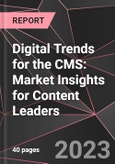The “Digital Trends for the CMS: Market Insights for Content Leaders” report is a 40-page market research and e-learning resource with compelling infographics. Stay ahead in the digital economy by leveraging these actionable insights and understanding the CMS landscape.
Visual learners rejoice! Infographics make this qualitative and quantitative analysis readily comprehensible. Immediately understand the intricacies of the CMS, glean the preferences of digital builders, discover critical requirements of online visitors, and grasp effective content strategies as data-driven and AI-masterminded practices supersede traditional playbooks.
In a world where content is king and user engagement the ultimate prize, the choice of the right CMS tool can make or break a digital strategy. Pandemic-driven digital adoption altered customer preferences drastically, so brands must pivot to digital first approaches.
The rise of “headless” architectures, behind-the-scenes AI, and the nuanced debate between commercial cloud-based solutions versus open-source options all underscore the need for technologically astute and creative professionals to stay up-to-date. With this resource, IT teams can anticipate the needs and challenges that accompany the adoption of CMS platforms, ensuring smoother transitions and robust implementations. For digital marketing teams, this report provides actionable strategies, making the tech stack’s capabilities tangible and relevant. The differences and strengths of headless CMS platforms are concisely captured, so that decision-makers can align with cost-effective resources and tailor their content strategies.
The report also visualizes over 20 quantitative insights about the CMS and related digital marketing practices as infographics at the conclusion, ensuring that the subject matter can be readily grasped and shared internally.
“Digital Trends for the CMS: Market Insights for Content Leaders” Report Highlights:
- Modern content management systems (CMS) are transforming creative work and the digital economy by breaking away from rigid legacy systems and enabling unique digital customer experiences.
- Headless and decoupled systems allow teams to quickly create, launch, and manage their content and campaigns. These new systems represent a form of operational agility, reducing downtime and accelerating updates or iterations.
- An innovative, easily accessible CMS can help to future-proof businesses and improve marketing funnels while also reducing friction in IT and marketing departments. In the current environment, it’s essential to modernize content management systems to meet increasing demands, free content from code and silos, and stay agile in the face of ever-changing algorithms and policies.
- IT professionals and digital builders have indicated that the wrong systems limit their creativity and performance, contributing to job dissatisfaction and, potentially, turnover. This highlights the need for more advanced CMS solutions that enable a smoother user experience for both creators and customers.
- Online shoppers have high expectations for user experience, with many forming e-commerce impressions within seconds and abandoning their carts or customer journeys if the experience does not go smoothly. E-commerce sites must prioritize navigation/layout improvements and faster loading speeds to acquire and retain customers.
- Businesses that invest in and adapt around these dynamic systems can better leverage data analytics, artificial intelligence, and machine learning advancements.
- E-commerce platform Magento has evolved following Adobe’s acquisition. Contentful and Storyblok were associated with the rise of “headless” platforms. While these options have different histories and can be integrated to serve broader use cases, the defining philosophy today is flexible content management.
- In this digital renaissance, content management is more than just a platform or tool - it’s the canvas for innovation. The increased usage of modern CMSs, particularly headless and decoupled varieties, heralds a paradigm shift in how businesses empower their digital builders to sculpt immersive experiences and capture digital economy growth.
This report will provide answers to the following questions:
- What differentiates a modern CMS from its predecessors?
- What role does the CMS play in operational efficiency and today’s digital economy?
- What are digital builders prioritizing in their CMS choices and tactics?
- What do online customers expect from digital experiences?
- What strategic maneuvers can ensure you lead in the CMS game?
- How are Adobe Commerce, Contentful, and Storyblok transforming content delivery?
Table of Contents
Companies Mentioned (Partial List)
A selection of companies mentioned in this report includes, but is not limited to:
- Adobe Commerce (formerly Magento)
- Amazon
- Contentful
- Storyblok
- WordPress (WordPress Foundation, Automattic Inc.)








